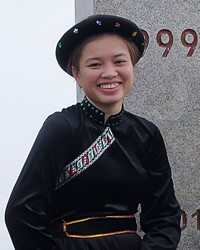Nung in Vietnam

Photo Source:
Copyrighted © 2026
Thi - Shutterstock All rights reserved. Used with permission |
Send Joshua Project a map of this people group.
|
| People Name: | Nung |
| Country: | Vietnam |
| 10/40 Window: | Yes |
| Population: | 1,131,000 |
| World Population: | 1,131,000 |
| Primary Language: | Nung |
| Primary Religion: | Ethnic Religions |
| Christian Adherents: | 1.00 % |
| Evangelicals: | 0.03 % |
| Scripture: | New Testament |
| Ministry Resources: | Yes |
| Jesus Film: | Yes |
| Audio Recordings: | Yes |
| People Cluster: | Zhuang |
| Affinity Bloc: | Southeast Asian Peoples |
| Progress Level: |
|
Introduction / History
Nung is one of the many Tai groups of Southeast Asia. These people are closely related to the Tho and the Zhuang peoples of China. The Nung homeland is in northern Vietnam, close to the Chinese border. A small number are in Laos.
What Are Their Lives Like?
The Nung are hardworking farmers. They primarily live in the hilly areas, where they raise rice, fruit, peanuts, vegetables, seeds and corn. Their farming techniques are more advanced than their neighbors and some consider them to be the best farmers in Vietnam. Some have edible fish swimming in their swampy rice fields. They raise livestock, but that's not their primary activity.
The Nung are widely known for their traditional craft of intricate embroidery and bamboo-ratan goods. Their women grow their own cotton and indigo from which they produce cloth. This cloth is beaten until it surface becomes glossy.
The Nung people are divided into several clans. Their societies are both patrilocal and patrilineal. This means they live near the husband's relatives and the ancestral lines are traced through the males.
A mediator arranges marriages. He/she negotiates between the man and the bride's parents. They take the woman's wishes into consideration before there is a final agreement. If she accepts the proposal, a Mo master examines the birth dates of the couple, comparing them with the signs of the zodiac. He then determines whether they are compatible for marriage. The Mo master then selects a date for the ceremony according to the stars.
After the wedding, the bride leaves her home and moves in with her husband and his family. From that time on she is completely dependent on her husband and his family. Newlyweds rarely have their own separate home. Although Nung men sometime marry women of other ethnic groups, the women believe in strict endogamy (marriage within their own clans). Wealthy Nung men may have more than one wife, and they all live together in one house.
The Nung cluster their houses close together, usually on stilts. They have fruit trees and gardens near their homes. They walk to their fields on narrow, windy trails. Some homes have nearby huts where they do handicrafts such as basketweaving, carpentry or metal working.
What Are Their Beliefs?
Traditional Mursi religion involves faith in forces of nature and a supernatural power that determines their well-being. They pray to a supernatural being named Tumwi for their needs. The Komoru is their religious leader who is a middle man between the spirit world and humankind. He prays and does rituals on behalf of the Mursi people. This is especially true in times of natural disasters where there need are great.PRGRPHThere is also a strong Christian presence among the Mursis that can spread Christ's glory to others. They had a Christian doctor in the 1960s who gave his own blood to save Mursi people from a yellow fever outbreak.
What Are Their Needs?
The Mursis need protection. Their land is good, and others want to use it without offering compensation.
Prayer Points
Pray for the Lord to give the Nung people in Vietnam and Laos an abundant harvest this year as a testimony of his power and love.
Pray for the Nung people to have hearts that are open to the abundant blessings of Jesus Christ.
Pray for their families to prosper financially and spiritually as they experience a relationship with Jesus Christ.
Pray for a movement to Christ among the Nung that will spread joy, peace, and salvation to other peoples throughout Southeast Asia.